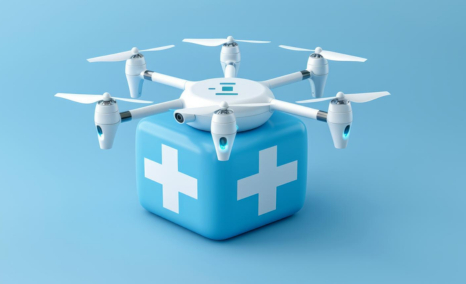8 Game-Changing Applications of Healthcare Mobility Solutions
Jan 22, 2025
Table of Contents
In today’s fast-paced world, healthcare mobility solutions are transforming the way care is delivered, making it smarter, faster, and more accessible than ever. From real-time patient monitoring and seamless teleconsultations to efficient appointment management and medication tracking, these solutions are bridging the gap between patients and providers. With cutting-edge mobile apps and innovative technologies, healthcare is no longer confined to hospital walls—it’s in the palm of your hand. Embrace the future of connected care and elevate patient experiences with healthcare mobility solutions designed to empower, innovate, and heal.
Read our blog “Healthcare Mobility Solutions: Revolutionizing Patient Care and Operational Efficiency” to learn more about healthcare mobility solutions
Downloads
Click Here To Get the Article in PDF
Recent Articles
- The Automated Eye: How AI-Driven Diagnostics are Reshaping the Future of Medical Imaging
- How Medical Drones Are Revolutionizing Healthcare: Transforming Patient Care, Delivery, and Emerg...
- Medication Management Systems: The Key to Optimizing Pharmaceutical Care
- Telemedicine: Can it be the future of healthcare?
- Healthcare Asset Management: Optimizing Resources for Better Patient Care
Top 8 Ways Healthcare Mobility Solutions Are Driving Innovation in Medicine
Healthcare mobility solutions are transforming the way medical services are delivered, enhancing efficiency, improving patient outcomes, and enabling real-time communication between stakeholders. From telemedicine to remote patient monitoring, these solutions are driving innovation in the healthcare industry. Here are the top 8 applications of healthcare mobility solutions that are shaping the future of medicine:
Telemedicine and Virtual Consultations
Telemedicine has revolutionized healthcare delivery by enabling remote consultations between patients and healthcare providers through video calls, mobile apps, and online platforms. This technology bridges the gap for individuals living in rural or underserved areas, granting them access to high-quality medical care without the need to travel. By leveraging telemedicine, patients can receive diagnoses, treatment plans, and follow-up consultations from the comfort of their homes, reducing stress and improving convenience.
One of the most significant benefits of telemedicine is its ability to alleviate the burden on healthcare systems. It minimizes overcrowding in clinics and hospitals by handling routine check-ups, chronic disease management, and minor health concerns remotely. Telemedicine also enhances efficiency by offering real-time communication, ensuring timely interventions, and reducing waiting times. In emergency scenarios, virtual consultations can provide immediate guidance until in-person care is available, potentially saving lives.
The rise of telemedicine during the COVID-19 pandemic underscored its importance in maintaining healthcare access while ensuring safety. As telemedicine technologies continue to advance, features like AI-powered diagnostics, language translation, and integration with wearable health devices are further expanding their capabilities, making them a cornerstone of modern, patient-centered healthcare.
Remote Patient Monitoring
Remote patient monitoring is a technology-driven healthcare solution that allows healthcare providers to monitor patients’ health data from a distance. Using patient monitoring devices such as wearable sensors, home monitoring tools, and mobile applications, RPM collects real-time information on vital signs like heart rate, blood pressure, blood sugar levels, and oxygen saturation. This data is securely transmitted to healthcare professionals, enabling them to assess a patient’s condition without requiring an in-person visit. RPM has become particularly valuable for managing chronic conditions like diabetes, hypertension, and heart disease, as it allows for continuous tracking and early detection of potential complications.
The primary benefits of RPM include improved patient outcomes and reduced healthcare costs. By closely monitoring patients remotely, healthcare providers can intervene promptly when changes in a patient’s condition are detected, leading to fewer hospital readmissions and a decrease in emergencies. RPM also promotes greater patient engagement and self-management, as individuals can take a more active role in tracking their health. This increased involvement fosters a sense of empowerment, helping patients stay on top of their treatment plans and making them more likely to adhere to medication schedules and lifestyle recommendations. As RPM technology continues to evolve, its potential to improve healthcare delivery and patient care will only grow.
Mobile Health Apps for Personalized Care
Mobile health apps have emerged as powerful tools for empowering patients to take charge of their own health and well-being. These apps offer a variety of features that allow users to track their daily activities, monitor vital signs, and manage chronic conditions, all from the convenience of their smartphones. For example, patients with conditions like diabetes can use apps to log their blood sugar levels, track meals, and receive personalized feedback or alerts, helping them stay on top of their health. Other apps help individuals set fitness goals, track exercise routines, and maintain a healthy diet, contributing to overall wellness.
Explore more on how Mobile Health Apps are revolutionizing obesity treatment
Moreover, mobile health apps foster better patient engagement by providing real-time insights into an individual’s health data. By analyzing patterns and trends, these apps offer tailored recommendations for improving lifestyle habits, such as adjusting nutrition or increasing physical activity. They can also integrate with wearable devices, offering continuous monitoring of health parameters such as heart rate, sleep quality, and activity levels. With features like medication reminders and stress management tools, these apps create a comprehensive and personalized approach to healthcare, enabling users to make informed decisions about their health and well-being.
In addition to providing personalized care, mobile health apps also enhance the relationship between patients and healthcare providers. Many apps allow for easy communication between patients and doctors, enabling virtual consultations, symptom tracking, and medication management. By providing patients with the tools to manage their own care and stay connected with their healthcare team, mobile health apps play a crucial role in improving both patient outcomes and satisfaction.
Enhanced Clinical Communication and Collaboration
In the healthcare sector, effective communication is crucial for delivering high-quality care. Healthcare mobility solutions play a pivotal role in improving clinical communication and collaboration by offering real-time connectivity between medical professionals. Mobile-enabled platforms allow doctors, nurses, and other healthcare staff to securely exchange patient information, discuss cases, and collaborate on treatment plans, regardless of their physical location. This instant access to vital information ensures that healthcare teams are aligned and can make informed decisions quickly, particularly in critical situations where time is of the essence.
Furthermore, these solutions enhance collaboration across multiple disciplines, ensuring that specialists, general practitioners, and support staff can work together seamlessly. Secure messaging apps and video conferencing tools enable healthcare providers to consult with each other or even with patients, reducing delays in treatment and promoting faster decision-making. The ability to collaborate in real time, with access to updated patient data, leads to improved patient outcomes, fewer medical errors, and increased efficiency in healthcare delivery. As a result, healthcare mobility solutions are proving essential in fostering a more coordinated, patient-centered approach to care.
Electronic Health Records (EHR) Accessibility
The accessibility of electronic health records through mobile devices is a game-changer in modern healthcare. By enabling healthcare providers to access patient data anytime and anywhere, EHR systems help improve the efficiency of care delivery. Doctors and nurses no longer need to rely on physical charts or be restricted to desktops in clinics or hospitals. Instead, they can quickly retrieve patient histories, lab results, diagnoses, treatment plans, and medication records directly from their smartphones or tablets. This mobility ensures that medical professionals are always informed, allowing them to make timely, informed decisions, especially in critical or emergencies.
Mobile-enabled EHR systems also enhance patient care by improving continuity of care. As patients move between various healthcare settings—such as from primary care to specialists or from outpatient services to hospitals—having access to their complete medical records ensures that no information is lost or overlooked. This seamless transfer of data reduces the risk of medical errors, enhances diagnosis accuracy, and promotes a more integrated approach to healthcare. Moreover, EHR accessibility helps in monitoring patient progress over time, allowing healthcare providers to track outcomes and adjust treatment plans as necessary, ultimately leading to better patient outcomes and satisfaction.
Stay ahead of the curve: Discover how Electronic Health Records are shaping modern healthcare practices
Appointment Scheduling and Patient Management
Mobile healthcare solutions have revolutionized appointment scheduling and patient management, providing both patients and healthcare providers with greater flexibility and efficiency. Patients can now schedule, reschedule, or cancel appointments directly through user-friendly mobile applications, significantly reducing the time and effort traditionally involved in appointment booking. With features such as real-time availability and automatic reminders, these apps enhance patient convenience, reduce no-show rates, and optimize the healthcare provider’s daily operations.
For healthcare providers, mobile scheduling systems improve the management of patient flow, ensuring that resources are used effectively. By integrating appointment scheduling with EHR, healthcare professionals can access patient information instantly, streamlining pre-consultation preparations. Automated reminders, whether via text, email, or app notifications, help patients adhere to their appointments, leading to more consistent care and reducing the administrative burden on staff. Additionally, healthcare mobile solutions enable patients to select time slots that work best for them, ensuring better satisfaction and fostering a more personalized healthcare experience.
Medication Management and Pharmacy Solutions
Medication management is a critical aspect of patient care, and healthcare mobility solutions have significantly improved its effectiveness. Mobile applications help patients stay on track with their prescriptions by offering features such as medication reminders, dosage tracking, and refill notifications. By providing patients with timely alerts, these solutions reduce the risk of missed doses or incorrect medication administration. Additionally, mobile-enabled medication management empowers patients to actively participate in their treatment plans, promoting better adherence and improved health outcomes.
For pharmacies, healthcare mobility solutions offer an efficient way to manage prescriptions, inventory, and customer interactions. E-prescribing allows healthcare providers to send prescriptions directly to pharmacies, reducing the chances of errors and improving the speed of medication fulfillment. Mobile apps also enable pharmacies to manage stock levels in real-time, ensuring they can quickly address shortages and optimize inventory. Patients can use pharmacy apps to order medications, track deliveries, and even access pharmaceutical advice, enhancing their overall experience while ensuring accurate and timely dispensing of medicines.
Emergency Response and Ambulance Services
In emergencies, the rapid and efficient mobilization of medical resources is critical to saving lives. Healthcare mobility solutions significantly enhance the response time and effectiveness of emergency medical services (EMS). Mobile apps equipped with GPS and real-time tracking allow emergency responders to locate patients quickly, even in hard-to-reach areas. Additionally, patients can use mobile apps to request ambulance services, providing their location with precise accuracy. This streamlined process ensures that ambulances are dispatched promptly, and emergency medical teams can reach the scene faster, potentially making a difference in life-threatening situations.
Moreover, integration between EMS systems and hospital networks allows real-time sharing of patient information. When an ambulance is en route, medical data such as vital signs, medical history, and treatment progress can be sent directly to the receiving hospital. This enables the medical team to prepare for the patient’s arrival, ensuring that the necessary medical interventions are ready upon arrival. With this mobile-enabled collaboration, emergency responders can provide critical care en route, significantly improving patient outcomes and optimizing the overall emergency response system.
Conclusion
Healthcare mobility solutions are revolutionizing the healthcare landscape by enhancing accessibility, efficiency, and patient engagement. These applications not only streamline healthcare delivery but also improve the overall quality of care. As technology continues to evolve, the potential for healthcare mobility solutions to address emerging challenges and improve outcomes will only grow, making them indispensable in the healthcare ecosystem.
In addition to the advancements already mentioned, healthcare mobility solutions also play a significant role in addressing the growing demand for personalized care. As patients increasingly expect tailored treatment plans and better access to their healthcare data, mobile technologies enable real-time updates and direct communication between patients and providers. By bridging the gap between technology and human-centered care, these solutions promote a more patient-centric approach, enhancing the overall experience for both healthcare professionals and patients.
The future of healthcare is undoubtedly moving towards more integrated, mobile-enabled solutions. With innovations like AI-driven diagnostics, telemedicine advancements, and expanded remote monitoring capabilities, healthcare mobility solutions will continue to shape the industry. As healthcare providers, patients, and technology companies collaborate, the focus will remain on improving outcomes, reducing costs, and increasing patient satisfaction, ensuring that healthcare systems are more agile and responsive to the needs of modern society.

Downloads
Article in PDF
Recent Articles
- Medical Odyssey: Solving the Dynamic Puzzle of Global Tourism Market
- Healthcare Mobility Solutions: Revolutionizing Patient Care and Operational Efficiency
- From Sight to Insight: The Rise of Smart Ophthalmological Devices in Eye Care
- How Medical Drones Are Revolutionizing Healthcare: Transforming Patient Care, Delivery, and Emerg...
- Healthcare Asset Management: Optimizing Resources for Better Patient Care



